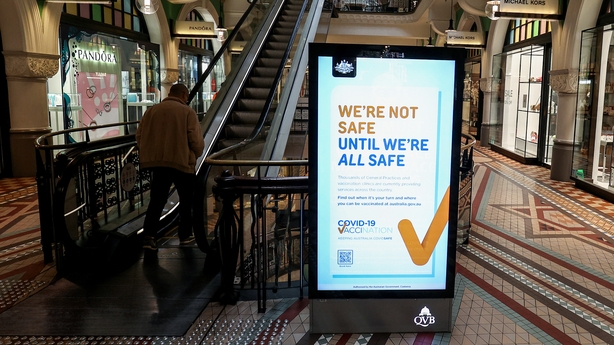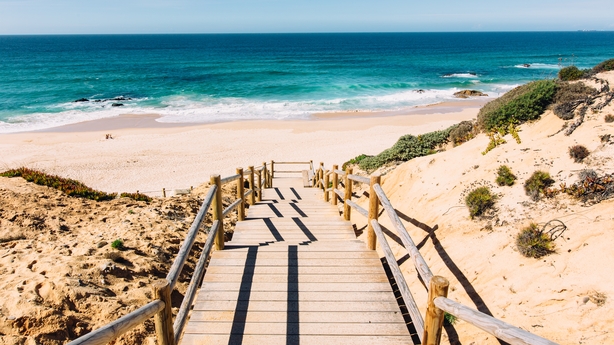Australian officials extended lockdown and social distancing measures to more of the country, with four major cities already under a hard lockdown in a race to contain an outbreak of the highly contagious Delta coronavirus variant.
Around one in two Australians are under stay-at-home orders, with millions of others subjected to movement curbs and mandatory mask-wearing amid Covid-19 flare-ups in several locations.
With more than five million residents of greater Sydney under a two-week lockdown until 9 July, New South Wales state reported 22 new locally transmitted Covid-19 cases today, all linked to prior infections.
That was up slightly from the previous two days, but still below the peak of the current outbreak of 30 new cases reported on Sunday.
"New South Wales is demonstrating a steady rate of cases at this stage ... but to date our fears about huge escalation haven't materialised and we certainly want to keep it that way," state Premier Gladys Berejiklian told reporters in Sydney.
With a total of around 170 new locally transmitted cases since the first infection was detected two weeks ago in a limousine driver who transported overseas airline crew, NSW is the worst-affected state or territory in the current outbreak.
Residents of Sydney, Perth, Brisbane and Darwin were joined in lockdown on Wednesday by those of the outback town of Alice Springs, the gateway to UNESCO World Heritage-listed Uluru.
Officials issued stay-at-home orders for the town after a potentially infected traveller used the airport.
South Australia, meanwhile, reported its first locally transmitted cases for 2021, but stopped short of imposing a full lockdown, saying they believed the threat was contained.
Officials instead limited home gathering and urged people to wear masks in public after they reported five new cases - a miner who had returned home from a Northern Territory mine and his wife and children who had been in self-isolation.
Elsewhere in the country, Queensland reported three new locally acquired cases, Western Australia logged one and the Northern Territory recorded none.

Singapore said travellers from Australia will have to undergo home quarantine for a week from Friday.
Lockdowns, tough social distancing, swift contact tracing and a high community compliance have helped Australia quash prior outbreaks and keep its Covid-19 numbers relatively low. It has reported just over 30,550 cases and 910 deaths since the pandemic began.
But less than 5% of its 20 million adult population has been fully vaccinated, leading to criticism of a sluggish national inoculation drive.
International tourism not seen rebounding until 2023 - UN report
International tourism arrivals are set to stagnate this year, except in some Western markets, causing up to $2.4 trillion in losses, a UN study said, adding the sector is not expected to rebound fully until 2023.
Covid-19 vaccination and certificates are key to restoring confidence in foreign tourism, which provides a lifeline for many countries, especially small island states that rely heavily on the sector to provide jobs, it said.
In 2020, international arrivals plunged by 73% from pre-pandemic levels in 2019, causing estimated losses of $2.4 trillion in tourism and related sectors, according to the report by UNCTAD and the UN's World Tourism Organization (UNWTO).

"The outlook for this year doesn't look much better," Ralf Peters of UNCTAD's trade analysis branch, told a news conference.
"The first three months were again bad, there was not much travelling happening," he said.
"There is an expectation of a certain recovery in the second half of the year, at least for North America and Europe to a certain extent," he told Reuters, crediting vaccinations.
The report sets out three scenarios for 2021, showing international tourism arrivals forecast to drop by between 63% and 75% from pre-pandemic levels, resulting in losses of between $1.7 trillion and $2.4 trillion.
"In international tourism we are at levels of 30 years ago, so basically we are in the '80s ... Many livelihoods are really at threat," said Zoritsa Urosevic, Geneva representative of the Madrid-based UNWTO.
"What we are looking at in the long run is ... meeting the 2019 numbers after 2023," she said.
Sandra Carvao, chief of market intelligence at UNWTO, said that it would be a "very diverse recovery", varying by region and by country.
The European Union's digital Covid-19 certificate, due to come into force tomorrow, represents the only regional harmonisation to date, she said.
Ms Carvao, referring to travel corridors, said: "We see for example Asia-Pacific is still one of the most closed regions in the world at this moment - most of the borders in the countries are either totally closed or with significant restrictions."
France likely to have fourth wave of Covid - government adviser
France is likely to have a fourth wave of Covid-19 virus, due to a resurgence of cases caused by the Delta variant first found in India, said the French government's leading scientific adviser Professor Jean-François Delfraissy.
Nevertheless, Prof Delfraissy added that the rollout of vaccines would help mitigate the effect of this new wave of the virus, which many medical experts think could hit France by September or October.
"I think we will have a fourth wave, but it will be much more moderate than the previous three waves because the level of vaccinations is different compared to before," he told France Info radio.
French epidemiologist Arnaud Fontanet, who also advises the French government on scientific matters, told BFM TV that he expected France's Covid-19 infection numbers to rise again in September or October.
French Health Minister Olivier Veran said earlier this week that the Delta variant, whose rapid spread around the world has led some countries to reimpose travel restrictions, now represented around 20% of France's Covid cases.
Russia reports record virus deaths for second day in a row
Russia reported 669 coronavirus deaths over the past 24 hours, a record number of fatalities for the second day in a row, according to a government tally.
One of the pandemic hotspots is the city of Saint Petersburg, which is due to host a Euro 2020 quarter-final on Friday in front of thousands of fans, many of them flying in from abroad for the match.
President Vladimir Putin said he had received Russia's Sputnik V vaccine earlier this year after previously declining to disclose which vaccine he had taken.
Mr Putin, 68, received two vaccine shots in March and April, the Kremlin has said. Authorities did not publish video footage of him being inoculated.
He also told Russians during an annual phone-in that he was against mandatory vaccinations.
Over the past few weeks, Saint Petersburg and the capital Moscow have seen a spike in infections, with authorities re-introducing virus restrictions and pushing their struggling vaccination drive.
Moscow Mayor Sergei Sobyanin has said that the more contagious Delta variant first identified in India accounts for 90% of cases in the capital.
Nationwide infections grew by 21,042, bringing Russia's caseload to more than 5.5 million, the tally showed.
With 135,214 deaths from the virus, Russia has the highest official toll from Covid-19 in Europe.

